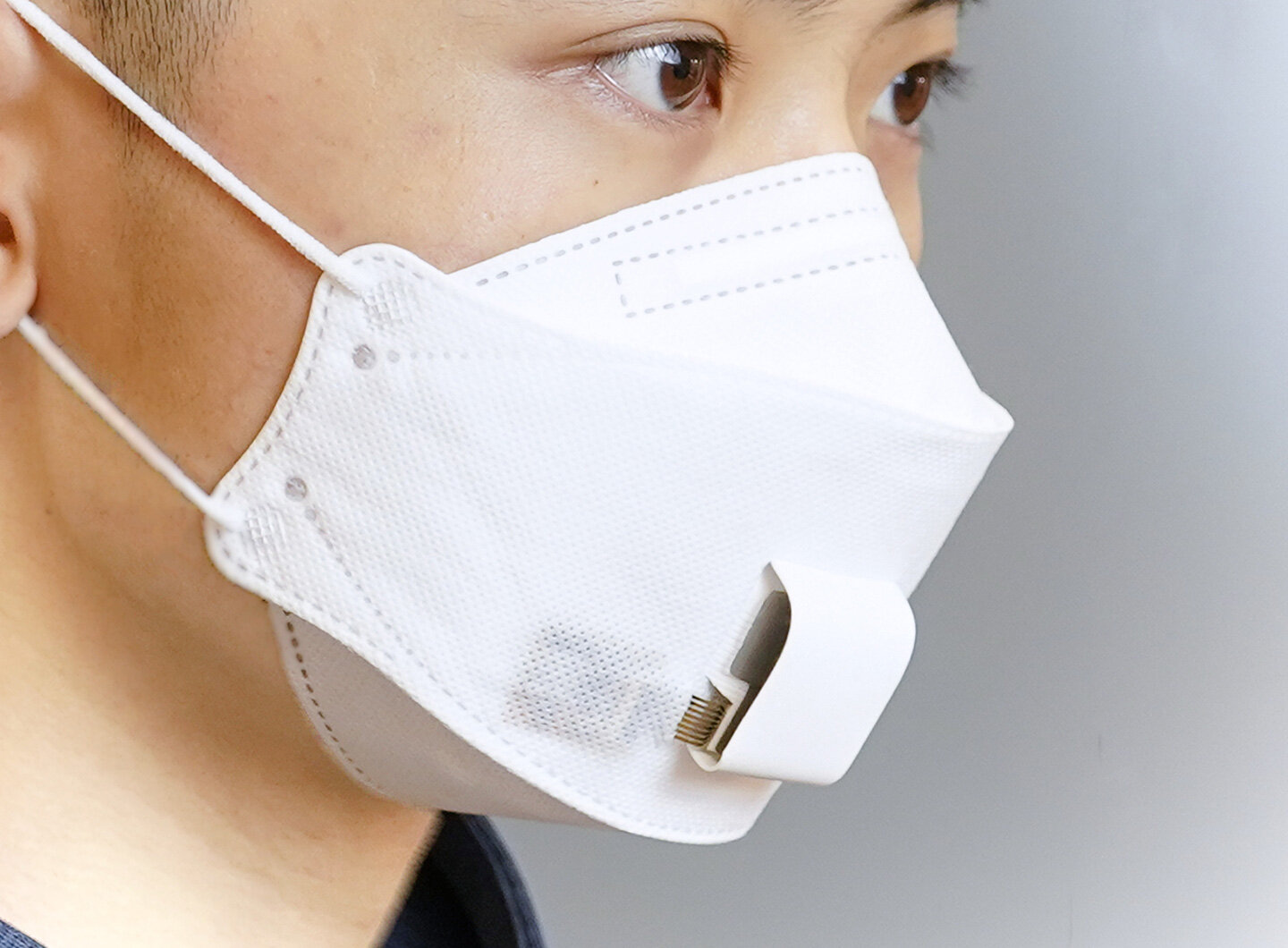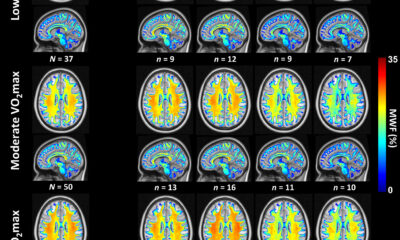Health
A smart mask monitors breath for signs of health

The EBCare mask can analyze the chemicals in a person’s breath in real time. Credit: Caltech/Wei Gao and Wenzheng Heng
Personalized wearable devices that monitor people’s health are on the rise. From watches to patches and other types of sensors, these smart devices can monitor heart activity, inflammation levels and more to help patients better manage their health from the comfort of their own home. Now a new type of wearable device can be added to the list: a high-tech paper mask that monitors breathing.
Caltech’s Wei Gao, professor of medical technology, and his colleagues have developed a prototype for a smart mask that could be used to monitor a range of medical conditions, including respiratory conditions such as asthma, COPD (chronic obstructive pulmonary disease), and post-operative disorders. -COVID-19 infections.
Unlike other smart masks being developed that monitor physical changes such as temperature, humidity or breathing, this mask, called EBCare, can analyze the chemicals in a person’s breathing in real time. (“EBC” is an acronym used in the field that means “exhaled breath condensate.”) For example, the mask could monitor asthmatics for nitrite levels, a chemical that signals airway inflammation.
“Monitoring a patient’s breath is something that is done routinely, for example to assess asthma and other respiratory conditions. However, this required the patient to visit a clinic for sample collection, followed by a wait for laboratory results,” says Gao, the principal investigator of a new study to describe the mask in the diary Science.
“Since COVID-19, people have been wearing masks more. We can use this increased mask usage for personalized remote monitoring to get real-time feedback on our own health at home or in the office. For example, we could use this information to assess how well, a medical treatment might work.”
Gao, who is also a Heritage Medical Research Institute researcher and Ronald and JoAnne Willens Scholar, has already developed a series of wearable biosensors that analyze human sweat to measure metabolites, nutrients, hormones and protein levels. In this case, Gao’s goal was to monitor breathing, which presented a new set of challenges.
In order to selectively analyze the chemicals or molecules in a person’s breath, it must first be cooled and condensed into a liquid. In clinical settings, this cooling step is performed separately from the analysis. Moist breath samples are cooled on ice buckets or large refrigerated coolers. Gao’s new mask, on the other hand, is self-cooling. The breath is cooled by a passive cooling system that integrates hydrogel evaporative cooling with radiant cooling to effectively cool the breath on face masks.
“The mask represents a new paradigm for the management of respiratory and metabolic diseases and precision medicine, as we can easily obtain breath samples and analyze the chemical molecules in breath in real time through daily masks,” said Wenzheng Heng, lead author of the study and graduate . Student at Caltec. “The breath condensate contains both soluble gases and non-volatile substances in the form of aerosols or droplets, such as metabolic substances, inflammatory indicators and pathogens.”
Once the breath is converted into a liquid, a series of capillaries, belonging to a class of devices called bioinspired microfluidics, immediately transports the liquid to sensors for analysis.
“We learned from plants how to transport water,” says Gao. “Plants use capillary forces to pull water up from the soil.”
The results of the analysis are then sent wirelessly to a personal phone, tablet or computer. “The smart mask can be manufactured at a relatively low cost,” Gao said. “It’s designed to only cost about $1 in materials.”
To test the masks, the team conducted a series of human studies, mainly focusing on patients with asthma or COPD. They specifically checked the patients’ breath for nitrite, a biomarker for inflammation in both conditions. The results showed that the masks accurately detected the biomarker, which indicated inflammation in the patients’ airways.
In another study, the team showed that the masks accurately detected blood alcohol levels in human subjects, suggesting that the masks could be used for on-the-spot alcohol monitoring or other forms of alcohol consumption monitoring.
They also looked at how the masks could potentially be used to evaluate blood urea levels in the monitoring and treatment of kidney disease. As kidney function declines, byproducts of protein metabolism, such as urea, build up in the blood. At the same time, the urea content in saliva increases, which is broken down into ammonia gas, and this leads to higher ammonium levels in the breath condensate. The new research found that the smart masks could accurately detect these ammonium levels, which closely reflected blood urea levels.
“These initial studies are a proof of concept,” says Gao. “We want to expand this technology to include different markers associated with different health conditions. This is a foundation for creating a mask that functions as a versatile platform for general health monitoring.”
As for the comfort of the masks, participants reported favorable experiences, even those with breathing problems.
“The smart mask platform for collecting and analyzing EBC represents a major advance in the potential to monitor lung health in real time,” said co-author Harry Rossiter, a researcher at the Lundquist Institute for Biomedical Innovation at Harbor-UCLA and professor of medicine at the David Geffen School of Medicine at UCLA. “That concept, that biosensors for a wide range of compounds could be added in the future, highlights the breakthrough potential of the smart mask for health monitoring and diagnostics.”
Other Caltech authors include graduate students Shukun (Kevin) Yin, Canran Wang, Hong Han, and Jiahong Li, and postdoc Jihong Min, in addition to Ehsan Shirzaei Sani and Yu Song, former postdocs at Caltech.
More information:
Wenzheng Heng et al., A smart mask for collecting and analyzing exhaled air condensate, Science (2024). DOI: 10.1126/science.adn6471. www.science.org/doi/10.1126/science.adn6471
Quote: Smart mask monitors breath for signs of health (2024, August 29) retrieved August 30, 2024 from https://medicalxpress.com/news/2024-08-smart-mask-health.html
This document is copyrighted. Except for fair dealing purposes for the purpose of private study or research, no part may be reproduced without written permission. The content is provided for informational purposes only.













